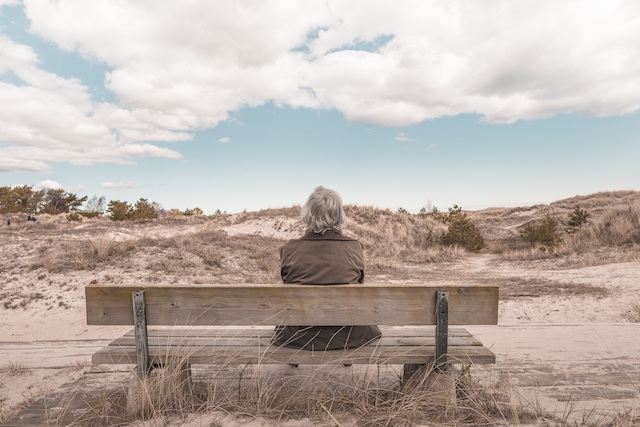“You probably want this on a pretty plate…”
A faint note of something like sarcasm or weary condescension colored my friend’s voice as she peered into the pot of homegrown Anasazi beans she had just cooked.
“I know what you’re going to say,” she added, “you don’t like the brown beans in a brown bowl.”
Her husband was still away on his latest trip, and we were in the kitchen, cooking a simple supper.
“Absolutely correct,” I smiled, giving a final stir to the sautéed greens under my command, freshly harvested from the garden. “Of course I want it on a beautiful plate.”
Rather than the cupboard where the everyday brown crockery sits, she opened the glass cupboard containing their Tuscan-style ceramics. She set two wide-rimmed, yellow, hand-painted bowls on the kitchen counter. Into each attractive vessel I scooped some of the steaming Anasazi beans, and then piled the briefly sautéed greens atop, enticing aromas of garlic and lemon wafting up.
Each with a glass of local Pinot Noir, we sat down to enjoy our simple rustic supper.
“You are one of the three most particular people that I know,” said my friend as she lit the two taper candles on the table, “just behind my sister. I’m not sure who the other one is, but you are certainly in the top three.”
I smiled at the remark, ignoring the slight edge to her tone, and shrugged.
“Food should always look beautiful,” I said, placing the cloth napkin in my lap and reaching for the garnet-hued wine and swirling it ’round in its glass.
“If you take the time to prepare a nice meal, even a simple one like this, it deserves a good plate. And yes, I am very particular… but the details matter to me. A meal is a multisensory event, more than just taste, and I appreciate the nuances of all the elements involved—an attractive dish, a proper wine glass, a cloth napkin, some nice cutlery. Candles. A quiet space to enjoy it. Sitting down to eat at the table. It all adds to the experience.”
She smiled at me with a tired look in her eye, as if she were just slightly amused at my apparent fussiness. I clasped her hand for a moment of silent thanks and we both dipped into the beautiful, broad bowls in front of us.
In the time since that dinner, my thoughts have often circled back to her comments about my desire for eating in beauty. Although some people might see it as fussy or precious, it’s actually so much more than being “particular.”
I’m a man who appreciates beauty on many different levels. As a French-trained cook, I believe preparing something to eat goes beyond simply getting food on a plate (although I will admit to moments of being ravenously hungry, or crashing blood sugar levels when appearances don’t matter much). And daily, I admire the ever-stunning display of nature, often stopping to behold a colorful flower, the graceful shape of a tree, a small weed or wild bird or whatever catches my eye. I cultivate beauty in my home environment, too, each thing carefully considered not only in its materials, look, craftsmanship and “feel,” but also in its placement in the room or space.
On some level, I’ve always been this way, even as a child. Most young boys, playing in the dirt with their model firetrucks, want to grow up to be firemen; I liked arranging flowers and wanted to be a florist. A bit later, I wanted to be a musician and a writer, but I always liked making things “nice” and pretty.
Since my earliest days I’ve been attuned to the sensual texture of things—a forest green velvet shirt I wore until the elbows were threadbare and it was two sizes too small (when my mother finally confiscated it), a loathing of the fuzzy skins of peaches, a keen fondness for silk and linen, an appreciation for complementary colors, a preference for soft-soled moccasins or to be barefoot on the earth.
In the last couple of years, I’ve also begun paying attention to beauty in a more focused way—consciously celebrating it. Through the long process of writing a book that centers on eros, an evolved masculinity and the soul, I realized that beauty nourishes us on a very profound level. I’m referring here to elemental beauty, as in nature: the sort that might arise from an artist’s craft but can never be fabricated or commercially produced. Authentic, natural beauty opens us through our senses, which is one of the requisites for a conscious, evolving life.
Western culture has widely confused superficial glamor with true beauty; the first merely fluffs up the ego, while the latter creates a resonance in our soul. Real beauty isn’t about “design;” it emerges from somewhere deep within.
To the ancient Greeks, Eros was the god of desire, the son of beautiful Aphrodite. As a handsome and alluring divinity, Eros embodied the masculine aspect of love, a powerful deity in his own right. Sometimes regarded as a male fertility icon, the god of desire personified the energies of lust and intercourse, as well as beauty and love.
To the Greeks, appreciating beauty was inherently part of the masculine.
Yet somewhere along the way in the past couple of millennia, we seem to have largely lost that key element of Eros, ceding the male celebration of beauty to artists and gay men.
At what cost, I wonder.
Beyond our physical gender, each of us embodies masculine and feminine traits in varying degrees. Because our society has essentially relegated the appreciation of beauty to the role of the feminine, however, men are uncomfortable claiming and celebrating it. Apart from the natural beauty of nature—say, a stunning coastline or painted sunset—men often act as if they cannot recognize beauty other than in the form of an attractive woman, as if it lessens their manhood to do so.
How limiting and stereotypical to say, “Well, he appreciates beauty because he’s gay.” Such a comment perpetuates the myth that straight men don’t or can’t appreciate beauty. It has nothing to do with our sexual preference, really. And if only women and gay men are the celebrants of beauty, men will continue to be estranged from their wholeness and authenticity.
Appreciating natural, elemental beauty is one of the most important things we can do in this life. It’s a soul practice, actually.
Yet in the nearly constant technological distraction of the modern world, beauty has to be utterly astounding to grab our notice, to somehow cut through the television, radio, phone calls, barrage of text messages and emails, daily drama and endless mental chatter. Most of us are simply not paying attention.
Beauty is everywhere, from the untamed wilderness to the solitary blade of grass pushing up through broken concrete in an inner city neighborhood. We simply need to open our eyes and hearts. And with only a modest effort, we can create it ourselves in our environment and life. Even if it’s only dinner. Or the manner in which we sit down to enjoy it—shared or solo—on a beautiful plate by candlelight.
I heartily salute the men—gay, straight and those dancing somewhere in between flimsy, convenient labels—who comfortably celebrate beauty where they encounter it. Or who take the time to create it in their personal environment and the world at large. It doesn’t make us less of a man to appreciate beauty; it makes us an evolved, conscious one.
Brother, here’s hoping that you find moments to pause and appreciate the beauty around you. Do it publicly. Openly.
I wonder, what was the most beautiful thing you witnessed today?
~
Relephant Read:
5 Things I’ve Learned About Conscious Manhood.
~
Author: L.R. Heartsong
Editor: Toby Israel
Photo: Mikael Kristenson/Unsplash
~


 Share on bsky
Share on bsky





Read 4 comments and reply